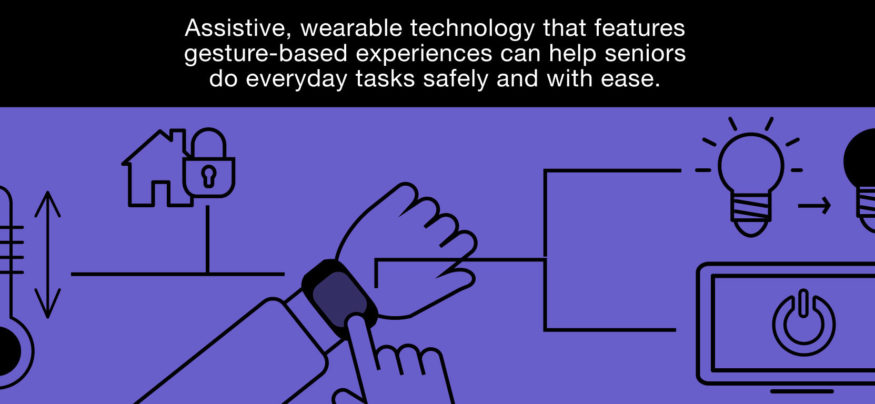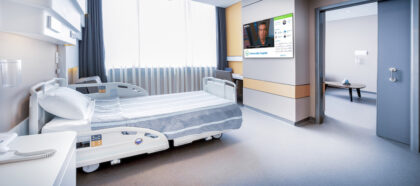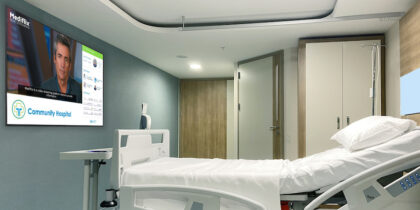Smartwatches are more than high-tech fashion accessories for millennials, or the next wave of mobile devices for on-the-go consumers. They are also transforming the healthcare space, particularly for seniors.
Innovative software developers are leveraging the sophisticated sensors in wearable devices to create solutions that help seniors age in place, while remaining continuously connected to the healthcare providers and caregivers who want to keep them safe.
For instance, Reemo is currently piloting a solution that provides assistive tech for seniors. By combining the Samsung Gear S2 smartwatch and SmartThings connected home technology, Reemo enables seniors to perform everyday household tasks with a flick of the wrist. By using simple hand gestures, for example, users can operate lights, locks, thermostats, televisions and smart appliances.
Meanwhile, care providers receive important data that enables them to remotely monitor patients’ health and well-being. “We give care providers and family members a snapshot of the senior’s daily life,” explains John Valiton, chief revenue officer for Reemo. “You can tell what time they got up, which rooms they’re spending the most time in, which tasks they’re having trouble with and when their health starts declining. This helps everyone make decisions about how the next level of care should be entered into based on data, rather than just emotional or anecdotal evidence.”
Transforming Assistive Care
The idea for Reemo was born a few years ago, when the father of one of the co-founders had two back-to-back strokes and lost the use of one side of his body.
“He was having a lot of emotional difficulties and feeling disempowered just navigating his own home,” says Al Baker, another co-founder and now CEO of Reemo. “So we gave him the ability to control everyday appliances, just by pointing and waving a remote attached to his wrist. We eventually built a smartwatch-based system that also enables those with limited mobility to be remotely monitored. This could be someone who’s just had surgery, is living in a healthcare facility or wants to stay at home longer.”
Reemo might eventually make this technology available to all consumers, but it is currently focused entirely on seniors and other mobility-impaired individuals. “We want to start by bringing it just to the people who need it most,” Baker explains. “These technologies are usually reserved for younger, nice-to-have buyers. The older demographic is generally forgotten.”
Keeping less tech-savvy users in mind, Reemo has worked hard to make the solution as simple and forgiving as possible. Mastering other gesture-based technologies often requires learning complex hand signals and making small, specific motions. But Reemo has boiled smartwatch gestures down to five motions: point to activate, raise or lower hand to turn an appliance off or on, and swipe left or right to control intensity.
The Reemo solution also includes a Samsung Galaxy Tab or smartphone, which acts as a hub for the system. “Seniors really enjoy the tablets,” says Baker. “It improves their online experience by enabling them to communicate with family and surf the Internet. Anything we can add to the front end to help users in their daily lives makes it more likely they’ll adopt the technology.”
Putting Assistive Tech in Action
Before going to market, Reemo is conducting a pilot at The Ohio Masonic Home, a senior care facility. Over the next four months, 60 residents will be using the Gear S2-enabled system.
“Users get the smartwatch and tablet, which have already been preconfigured to work with the Smart Things Hub,” says Baker. “All the IT staff has to do is open the box, install a couple smart plugs and sensors, and they’re off and running.”
The process is even simpler for users, who typically master the hand gestures in less than three minutes. So far, feedback from users has been very positive. “The Gear S2 is small and light, and it has the large click wheel, which is user-friendly for people with arthritis or dexterity issues,” says Valiton. “And since it is Samsung’s latest watch, it’s not a stigmatizing device for seniors. It’s not a pendant they have to wear that says, ‘Hey, I’m an old person.’ It’s the same smartwatch their grandchildren are wearing.”
Valiton says they’re also receiving great feedback from the providers, who say this technology helps them manage senior care more effectively, “without a lot of ambiguity over whether someone has gotten out of bed and is active, or whether they need help throughout the day or night.”
Once the pilot is complete, Reemo will sell the solution exclusively through healthcare providers over the next two years, including senior living facilities and hospitals. After that, the solution will be available to consumers.
Explore cutting-edge healthcare technology in more depth by checking out our full line of healthcare solutions.







